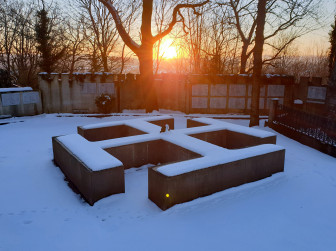d’après le Guide Totus du scoutisme (Sarment, 2007) par Louis et Rémi Fontaine,
Article paru dans la revue éclaireur des Europa scouts n°150 de septembre 2023.
« Nous parlons beaucoup en France de l’établissement d’une milice civique, d’une armée de l’ordre. Voilà plusieurs années que le Chef scout (B.P.) en a trouvé la formule et organisé les cadres. De cette armée pacifique qu’il a mise sur pied, plus encore que de sa victorieuse défense de Mafeking, l’Angleterre ne sera jamais trop reconnaissante envers Sir Robert Baden-Powell. » (P. Sevin)
Passant du particulier à l’universel, de la pédagogie concrète à la philosophie (et même à la théologie) morale et politique, bref du camp (ce « civisme à l’école des bois ») à la société civile où agit le scout, on touche là à l’impact social du scoutisme, selon l’intuition anthropologique de Baden-Powell et le rêve apostolique du père Sevin devant la multiplication des scouts et le succès d’un mouvement missionnaire capable effectivement de transformer le monde.
Par sa vision chrétienne de la société et des hommes, le scoutisme organise lui-même sa propre société dans ce monde d’après un « ordre scout » (selon le concept analogique du père Sevin) qui est une participation à l’ordre (social) chrétien.
L’ordre chrétien, c’est l’ordre naturel de la Création blessé par le péché originel mais restauré par l’ordre surnaturel apporté par le Christ et son Église. C’est l’union (distincte) de l’ordre naturel et temporel avec l’ordre spirituel et surnaturel, dont la chrétienté donne une image (nécessairement) imparfaite.
L’ordre scout, au sens général et moral que lui donne le père Sevin, ce sont les retrouvailles spécifiques du scoutisme catholique avec cet ordre chrétien quelque peu bousculé par la Révolution et le laïcisme qui séparent ce que Dieu a uni. N’y allant pas par quatre chemins, c’est ainsi qu’il le définissait et le prônait au vu de l’expansion du mouvement :
« Nous nous trouvions là en présence d’âmes d’une qualité nouvelle, d’un monde spirituel à part, d’un certain ensemble de pensées, d’aspirations qui tendent à se répandre, à s’imposer à l’attention et aux mœurs et à faire régner dans la société contemporaine un certain ordre intellectuel, moral et pratique qui, procédant du scoutisme, ne pourrait mieux se définir que par le terme d’ordre scout, au sens où l’ordre français régnait en Europe au siècle du Grand Roi, où l’ordre romain informait le monde à l’époque de la naissance du Christ. »
La comparaison est ambitieuse ! Et il précise encore :
« L’ordre scout, c’est la hiérarchie des choses telle que le scoutisme la suppose, la veut ou la fait… Nous n’avons rien inventé, et c’est cette identité essentielle avec l’ordre du christianisme, avec l’esprit du christianisme, qui fait notre seule force, notre seule valeur. Mais l’esprit de saint François d’Assise est bien l’esprit de Jésus-Christ et nul ne songe à contester l’orthodoxie et la joie franciscaine. Mais toutes les grandes familles spirituelles qui, au cours des siècles, ont pris naissance, familles bénédictine, carmélitaine, dominicaine, ignatienne et les autres, toutes certes avaient et ont toujours le seul esprit du Christ et de l’Église. C’est toujours le seul et même ordre chrétien qu’à leur façon elles réalisaient. » (Le Chef, janvier 1931).
Si le scoutisme est donc d’abord un tiers-lieu éducatif entre la famille et l’école, il constitue aussi une sorte de tiers-ordre spirituel, au sens où ses membres s’engagent personnellement et communautairement à vivre de manière spécifique la loi de l’Évangile et travaillent à établir le Règne du Christ dans le monde qui les entoure, et même au-delà. La figure d’une nouvelle chevalerie est la plus parlante. L’ordre religieux que voulait fonder le père Sevin, comme fleuron du scoutisme, devait être à l’ordre scout (et chrétien) ce que le levain est à la pâte, comme furent les moines-soldats à l’égard de la chevalerie et la chevalerie elle-même à l’égard de la société de son temps.
La famille scoute réalise en somme une sorte de « micro-chrétienté » en acte, opérant en tant que chrétienne, à son niveau éducatif, pour mieux former et envoyer ses membres agir en chrétiens dans le monde. Elle applique pro domo les principes d’une nouvelle chrétienté pour étendre l’ordre social chrétien du point de vue scout, « quand le spirituel couche dans le lit de camp du temporel », selon la métaphore de Péguy si adaptée à notre scoutisme. Elle constitue ainsi le contraire de ce que Jean-Paul II appelait une « structure de péché », qui décuple les péchés personnels par une incitation institutionnelle au vice. Car « de la forme donnée à la société dépend le bien ou le mal des âmes » (Pie XII).
Au milieu de l’égoïsme et de l’individualisme triomphants, le scoutisme est une fraternité, une institution, qui veut décupler au contraire les bonnes actions, le bien et les vertus par une contre-attaque du service souriant, par la réforme intérieure de soi-même. Un tremplin au service de la civilisation de l’amour. Un levier, parmi bien d’autres « structures de bien » certes, mais un levier qui peut soulever le monde.
Tel est l’ordre scout que définissait le père Sevin en consonance avec l’art de faire la paix proposé par Baden-Powell via la plus spectaculaire croisade des enfants qu’on n’ait jamais imaginé dans l’histoire de la planète.
Un rêve ? Pas seulement. Car il y eut bien un peu de cela, comme nous l’a montré l’histoire du scoutisme dans des débuts fulgurants, malheureusement contrariés par la crise de l’Église et de civilisation des années soixante. Et même si ce rêve à peine éveillé redevenait comme une goutte d’eau dans l’océan de la nouvelle évangélisation dont le monde a besoin aujourd’hui, c’est toujours une goutte qui manquerait à la mer, comme disait Mère Teresa. Cette goutte précieuse nous ferait toujours participer, comme scouts, à la communion ecclésiale et à la communion des saints, de manière spécifique. Elle serait aussi pour nous comme le grain de sénevé de la parabole (Mt 13, 24) ou comme la graine de moutarde :
Jésus leur présenta une autre parabole : « Voulez-vous une image du Royaume des Cieux ? Pensez à la graine de moutarde qu’un homme a prise pour la semer dans son champ. C’est la plus petite des graines, mais quand elle a grandi, elle est plus grande que les légumes. Elle devient un arbre, si bien que les oiseaux du ciel viennent s’abriter dans ses branches. » (Mt 13, 31)
Scoutisme : résurrection ! Tant qu’il y aura des scouts, le rêve en puissance peut toujours devenir réalité…
Apprends, mon scout, la leçon de l’insuccès. Apprends le mystère de l’obscurité. Apprends la fécondité du sacrifice. Ne t’étonne pas des échecs. Il y a des échecs productifs. Ne te scandalise pas de voir disparaître dans l’obscurité ceux qui te semblent destinés à remuer le monde. (Père Sevin)




